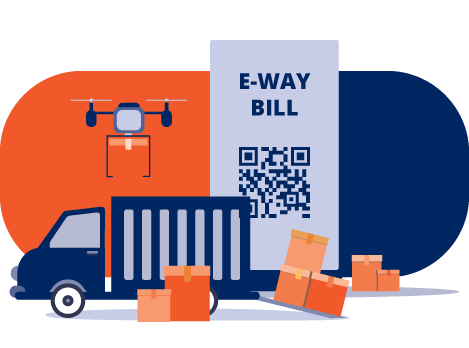eWay Bill

E-Way Bill Price
Market Price – Rs: 6,899
OnlineTaxSeva Price- Rs: 4,599 (All Inslusive)
“Note: Please talk to an advisor first and get all doubts resolved before proceeding with payment. Once we receive the payment, our team will reach out to you and work on the service.”
Documents required For E-Way Bill
Supply of GoodsInvoice/ Bill of supply/ Challan relevant to the consignment of goods. |
Transport IDTransporter ID or the vehicle number. |
Transport DocumentTransporter ID, Transport document number, and date |
Details Of eWay Bill:
eWay Bill is an electronic document generated on the eWay Bill Portal that is used to track the movement of goods from one place to another, either within the same state or across state borders. The eWay Bill is generated when there is a consignment of goods valued at more than Rs. 50,000 and is required for transportation of goods by road, rail, air, or waterways. The eWay Bill is mandatory for both the supplier and the transporter, and failure to comply with the eWay Bill rules can lead to penalties.
The eWay Bill system was introduced by the Indian government under the Goods and Services Tax (GST) regime to streamline the movement of goods across state borders and ensure seamless transportation of goods across the country. The eWay Bill is generated by the consignor, or the supplier, of the goods or by the transporter, as the case may be, and is valid for a specific period depending on the distance traveled by the goods.
To generate an eWay Bill, the supplier or the transporter must provide details of the consignment, including the name of the consignor, consignee, and transporter, as well as the place of origin and destination, the mode of transport, and the goods being transported. Once the eWay Bill is generated, it must be carried along with the goods being transported and presented for inspection to any relevant authority upon demand.
The eWay Bill system is aimed at reducing the burden of compliance for businesses, as it replaces the multiple forms and permits previously required for the movement of goods. The eWay Bill system also helps to prevent tax evasion and ensures that the government has a record of all goods being transported across the country. Overall, the eWay Bill system is a significant step towards the digitization of the Indian economy and the modernization of the country’s transportation and logistics infrastructure.
ELIGIBILITY CRITERIA:
n eWay bill is a document required for the movement of goods valued at more than Rs. 50,000 (in India) from one place to another, either within a state or between different states. The following entities are required to generate an eWay bill:
-
Registered GST taxpayers: GST registered taxpayers who are involved in the movement of goods that are worth more than Rs. 50,000 must generate an eWay bill, irrespective of whether the movement is for sale, purchase, or for any other reason.
-
Transporters: If the registered GST taxpayer has not generated the eWay bill, then the transporter who is responsible for the transportation of goods should generate the eWay bill on behalf of the registered GST taxpayer.
-
Unregistered persons: If an unregistered person needs to transport goods that are worth more than Rs. 50,000, then they need to generate an eWay bill by registering on the eWay Bill Portal.
It is essential to note that the eWay bill should be generated before the commencement of the movement of goods.
DOCUMENTS REQUIRED FOR EWAY BILL:
eWay bill is a document required for the movement of goods valued at more than Rs. 50,000 (in India) from one place to another, either within a state or between different states. The eWay bill is generated electronically on the eWay Bill Portal or through SMS. To generate an eWay bill, certain documents need to be available, and they are:
-
Invoice/ Bill of Supply/ Delivery Challan: The invoice, bill of supply or delivery challan for the goods being transported is required to generate the eWay bill. This document contains details of the goods, including their description, quantity, value, and tax details.
-
Transporter ID: If the goods are being transported by a registered transporter, their transporter ID or vehicle number needs to be entered into the eWay bill.
-
GSTIN of the Supplier and the Recipient: The GST identification number (GSTIN) of the supplier of the goods and the recipient of the goods need to be entered into the eWay bill.
-
HSN Code: The Harmonized System of Nomenclature (HSN) code for the goods being transported needs to be entered into the eWay bill. The HSN code is a six-digit code used to classify goods for taxation purposes.
-
Transport Document Number: The number of the transport document, such as the Goods Receipt Note (GRN), Goods Transporter Note (GTN), or Railway Receipt, needs to be entered into the eWay bill.
-
Vehicle Number: The vehicle number or the mode of transport used for the transportation of goods needs to be entered into the eWay bill.
The above documents are required to generate an eWay bill. The eWay bill must be generated before the commencement of the movement of goods and should be available with the person in charge of the conveyance during the transportation of the goods.